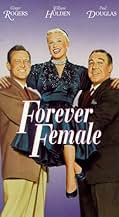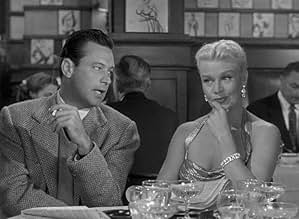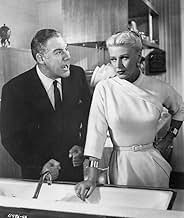CALIFICACIÓN DE IMDb
6.5/10
700
TU CALIFICACIÓN
Agrega una trama en tu idiomaAn aging actress refuses to admit she is too old to play the ingénue role anymore.An aging actress refuses to admit she is too old to play the ingénue role anymore.An aging actress refuses to admit she is too old to play the ingénue role anymore.
- Dirección
- Guionistas
- Elenco
- Premios
- 1 premio ganado en total
Marion Ross
- Patty
- (as Marian Ross)
Brandon Beach
- Diner at Sardi's
- (sin créditos)
Paul Bradley
- Actor in Play
- (sin créditos)
James Carlisle
- Diner at Sardi's
- (sin créditos)
Steve Carruthers
- Theatre Patron
- (sin créditos)
Oliver Cross
- Club Patron
- (sin créditos)
- Dirección
- Guionistas
- Todo el elenco y el equipo
- Producción, taquilla y más en IMDbPro
Opiniones destacadas
Charming, slight piece of entertainment sold by it top lined stars and almost scuttled by its featured player.
Ginger Rogers and Paul Douglas are most happily matched as the formerly married couple who are still best friends, a great Broadway star and her producer. Their interchanges are expertly played by two pros who are easy in each others company and really seem like they would have been together for years. Her gentle ribbing of him over back alimony is sweet and believable and actually provides a bit of insight into her character. She doesn't really expect to ever get it but neither does she ever plan to write it off either nor does she let get in the way of their relationship.
William Holden's part is secondary to the story although he is prominently featured due to his star status. He is his usual charismatic self making the minor part much better than it is. One ironic note is that in a story about Ginger Roger's character realizing she's too old for the ingénue role in Holden's play they cast an actor who is too old for his part. The playwright the way he is referenced should be in his early twenties, Holden extremely handsome and youthful though he may be is 35 if he's a day. He can't be held responsible for that since contract actors were routinely assigned parts at the studios whim.
Where the picture runs into trouble is the performance of Pat Crowley in what clearly was planned as a star making part. That didn't happen most probably due to the fact that as directed a more annoying, grating, jejune enactment of a character couldn't be possible. As she constantly proclaims that she is a great talent and better than anyone could imagine you want to push her out of the frame. The actress who did go on to some degree of fame, most notably as the star of TV's Please Don't Eat the Daisies, has proved to be an enjoyable presence elsewhere so the direction must be at fault but she really is hammy and unpleasant here.
Many fine character actors, James Gleason, Jesse White, George Reeves, Maidie Norman etc., add nice little touches throughout and hey look in one short scene its the future Mrs. C herself: Marion Ross just starting out.
A good comedy played by experts just ignore the ham-bone on the side of the action.
Ginger Rogers and Paul Douglas are most happily matched as the formerly married couple who are still best friends, a great Broadway star and her producer. Their interchanges are expertly played by two pros who are easy in each others company and really seem like they would have been together for years. Her gentle ribbing of him over back alimony is sweet and believable and actually provides a bit of insight into her character. She doesn't really expect to ever get it but neither does she ever plan to write it off either nor does she let get in the way of their relationship.
William Holden's part is secondary to the story although he is prominently featured due to his star status. He is his usual charismatic self making the minor part much better than it is. One ironic note is that in a story about Ginger Roger's character realizing she's too old for the ingénue role in Holden's play they cast an actor who is too old for his part. The playwright the way he is referenced should be in his early twenties, Holden extremely handsome and youthful though he may be is 35 if he's a day. He can't be held responsible for that since contract actors were routinely assigned parts at the studios whim.
Where the picture runs into trouble is the performance of Pat Crowley in what clearly was planned as a star making part. That didn't happen most probably due to the fact that as directed a more annoying, grating, jejune enactment of a character couldn't be possible. As she constantly proclaims that she is a great talent and better than anyone could imagine you want to push her out of the frame. The actress who did go on to some degree of fame, most notably as the star of TV's Please Don't Eat the Daisies, has proved to be an enjoyable presence elsewhere so the direction must be at fault but she really is hammy and unpleasant here.
Many fine character actors, James Gleason, Jesse White, George Reeves, Maidie Norman etc., add nice little touches throughout and hey look in one short scene its the future Mrs. C herself: Marion Ross just starting out.
A good comedy played by experts just ignore the ham-bone on the side of the action.
An aging stage star tries to hold on to ingénue roles. The screenplay is by the Epstein twins (Casablanca) based on a play by Barrie (Peter Pan). Given such pedigree, this comedy falls short of expectations but it is fairly enjoyable and has witty dialog. It's helped by good acting from Rogers as the actress in denial about her advancing years, Douglas as her supportive ex-husband, and Holden (on the verge of super-stardom) as a writer. A screen shot at the end of the film touts Crowley as a future star at Paramount. She never became a star, but she went on to have a long TV career, and she is winning here as a perky young actress.
This film was made in the shadow of ALL ABOUT EVE, and paints a more benign view of that film's central situation. Ginger Rogers plays a leading Broadway star, who retains a close relationship with her former husband (Paul Douglas), and works closely with playwright William Holden (possibly a softer build-up for his play director in Bing Crosby's/Grace Kelly's THE COUNTRY GIRL). Pat Crowley, a younger woman of some acting talent, is trying to break into the circles that cast and produce Broadway plays (she is doing mostly off-Broadway work). The relationship of these four characters are the basis of this comedy.
There are differences between the situation here and the situation in EVE. There was more of an atmosphere of the theater and it's traditions in EVE (because Joseph Mankiewicz writes literate scripts, and was determined to show what goes on behind the stage curtains). But there Bette Davis has gotten trapped into a lonely greatness on stage, and she turns out to be willing to vacate her pedestal if she can have a human life with Gary Merrill. She just does not like the way Anne Baxter is trying to replace her in her parts - Baxter's underhanded methods are despicable. Crowley is not Baxter. She genuinely admires Rogers, and just wants entry (which she may get through Holden). It is just that Rogers is still clinging to her youth - Holden is her last chance for such a cling when they go out together. But even Rogers realizes that she is beyond the point of return. In fact, towards the end of the film the audience and Holden and Crowley discover that Rogers actually gives herself a long summer vacation where she can wear softer, easier clothing and eat as much as she wants to. In the end she accepts that the scepter is passed, but she still has her old husband/friend/and continuous argument partner Douglass to play with.
There are differences between the situation here and the situation in EVE. There was more of an atmosphere of the theater and it's traditions in EVE (because Joseph Mankiewicz writes literate scripts, and was determined to show what goes on behind the stage curtains). But there Bette Davis has gotten trapped into a lonely greatness on stage, and she turns out to be willing to vacate her pedestal if she can have a human life with Gary Merrill. She just does not like the way Anne Baxter is trying to replace her in her parts - Baxter's underhanded methods are despicable. Crowley is not Baxter. She genuinely admires Rogers, and just wants entry (which she may get through Holden). It is just that Rogers is still clinging to her youth - Holden is her last chance for such a cling when they go out together. But even Rogers realizes that she is beyond the point of return. In fact, towards the end of the film the audience and Holden and Crowley discover that Rogers actually gives herself a long summer vacation where she can wear softer, easier clothing and eat as much as she wants to. In the end she accepts that the scepter is passed, but she still has her old husband/friend/and continuous argument partner Douglass to play with.
As an actress I have often admired Ginger Rogers. I am one of the few who think the films she made after the musicals she made with Fred Astaire are better than all that Art Deco Camp that still in some quarters has dominated her reputation. To name two only, ' Storm Warning ' and ' Tender Comrade '. She excelled as a witty serious actress, and when given the chance was riveting to watch. In this film she gives an exceptionally brave performance realising that a woman in the cold world of show business does not have to be, or should be always ' 29 '. Other people have remarked upon the certain similarities with ' All About Eve ' and there are some, especially with the main content being a new and apparently brilliant actress wanting to take her place in a stage play. This film is sexually bolder as Rogers plays a woman who unashamedly has had a sting of younger lovers with her ex-husband still very much an emotional focal point in her life. and she plays this up in many ways that Bette Davis in ' All About Eve ' could not have done. Rogers has a stronger sexual presence and shows it. The other brave aspect is her recognition that time is not on her side and the scenes where she admits that are truly moving, and without histrionics. William Holden is her latest conquest but his acting in the film does not match hers. He is also encumbered with many scenes with the aspiring young actress played very badly by Pat Crowley. She is nowhere in the same range of acting ability as Anne Baxter opposite Bette Davis. I am not sure if Irving Rapper the director was responsible but Pat Crowley was miscast and what could have been a very good film with a fine script loses much of its force and poignancy. I give it an 8 for the script itself, for Paul Douglas as the ex-husband and for the excellent Ginger Rogers.
This is a very good film that manages to entertain even though one of the characters was atrociously written. The film begins with a cocky young playwright (William Holden) being discovered. Although he's managed to offend a famous Broadway star (Ginger Rogers), he's also impressed her with his talent and good looks. The problem is that she wants to star in his play--even though she is WAY too old for the part. Even though they re-write it for her to play a character 10 years older, she still is too old for the part. But he wants the play to be produced and he's also in love with her. What's he to do?! And, what's he to do about Sally Carver--a spunky young actress who would be perfect for the part?
While Holden, Rogers and Paul Douglas all did great because they were real professionals and their parts were well written, I couldn't say the same for Pat Crowley (who played Sally). Although her character was supposed to be very eager and raw, she often came off as annoying and obnoxious. Her constant use of the word 'Siamese' and brash persona really turned me off--as I am sure it did for the audience. It's surprising, since the studio appeared to be grooming her for stardom--and the film's credits point out that she's a new discovery. But, if you can block out her character (at least until she evolves into a REALISTIC person later in the film), you will see a cool film--one that gives Rogers a chance to stretch herself and play a riskier role--an actress whose vanity is getting in the way of common sense. Well worth seeing.
While Holden, Rogers and Paul Douglas all did great because they were real professionals and their parts were well written, I couldn't say the same for Pat Crowley (who played Sally). Although her character was supposed to be very eager and raw, she often came off as annoying and obnoxious. Her constant use of the word 'Siamese' and brash persona really turned me off--as I am sure it did for the audience. It's surprising, since the studio appeared to be grooming her for stardom--and the film's credits point out that she's a new discovery. But, if you can block out her character (at least until she evolves into a REALISTIC person later in the film), you will see a cool film--one that gives Rogers a chance to stretch herself and play a riskier role--an actress whose vanity is getting in the way of common sense. Well worth seeing.
¿Sabías que…?
- TriviaSir James M. Barrie's original play, which is a short piece of less than an hour in length, dates from 1912 and is set in a small rural boarding-house "far from London", where a famous actress has elaborately disguised herself as a dowdy middle-aged type in order to escape from adoring admirers and her frantic celebrity lifestyle in the metropolis. As this indicates, this movie adaptation is a very free one.
- ErroresCrux of plot hinges on efforts of a Broadway producer and playwright to find ideal actresses to star in a play about a troubled mother/daughter relationship. Yet when the pair attends a summer stock production of the play, large poster outside theatre only includes photos of actress playing daughter and two male co-stars - completely ignoring actress who plays crucial mother role that's been talked about throughout entire film.
- Citas
Clara Mootz aka Sally Carver: How many drinks have you had, Mr. Phillips?
E. Harry Phillips: Innumerable. And the fact that I can still say "innumerable" suggests that that's nowhere near enough!
- Créditos curiososIn the end credits, Pat Crowley is billed as "A future Paramount star".
- ConexionesReferenced in Discovering Film: William Holden (2015)
Selecciones populares
Inicia sesión para calificar y agrega a la lista de videos para obtener recomendaciones personalizadas
Detalles
- Fecha de lanzamiento
- País de origen
- Idioma
- También se conoce como
- Forever Female
- Locaciones de filmación
- Productora
- Ver más créditos de la compañía en IMDbPro
- Tiempo de ejecución
- 1h 33min(93 min)
- Color
- Relación de aspecto
- 1.37 : 1
Contribuir a esta página
Sugiere una edición o agrega el contenido que falta




































